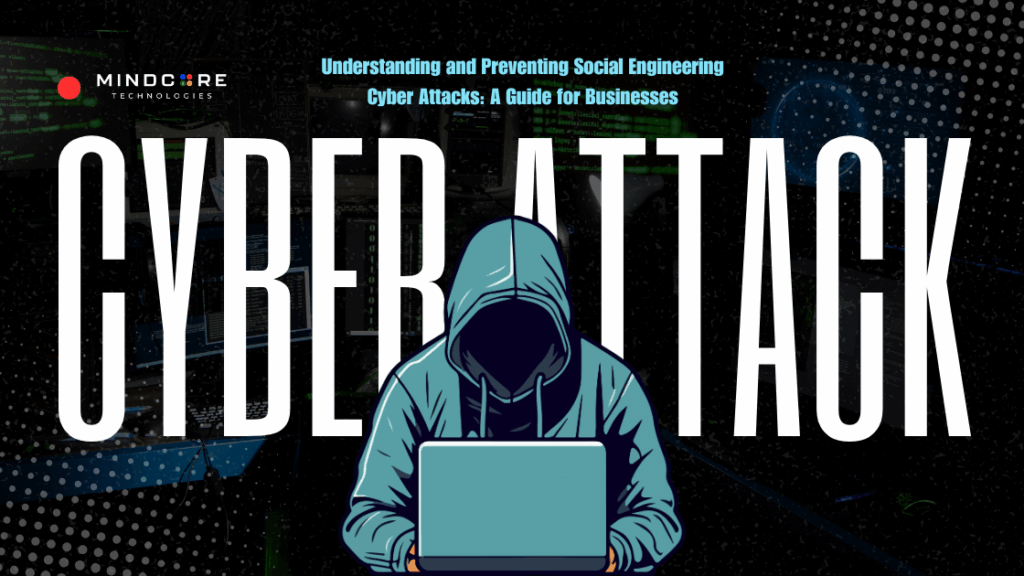In today’s digital age, e-crime has evolved and become more sophisticated than ever. Among these threats, social engineering attacks stand out due to their deceptive nature. Mindcore Technologies, as an IT services company, is dedicated to educating businesses about this issue and helping them address it. This article will dive into the details of social engineering attacks, how organizations can prevent them, and the importance of partnering with an IT firm like Mindcore Technologies in your cybersecurity strategy.
What Constitutes Social Engineering?
Social engineering involves using human interaction and manipulation through deception to make people reveal confidential information or perform activities detrimental to security. Instead of exploiting technical weaknesses like most traditional cyber-attacks, social engineering takes advantage of people’s psychology.
Common Kinds of Social Engineering Attacks

Phishing
In this case, attackers send false emails/messages pretending to be from reputable sources to trick recipients into giving out sensitive information like passwords or financial data.
Pretexting
Attackers create a fake scenario or impersonate someone trustworthy to get hold of details or gain entry into systems.
Baiting
With the baiting technique, criminals entice victims by promising them something good, such as free software/media files, but once downloaded infect their machines with malware.
Tailgating
An authorized person is physically followed by an attacker, who then gains access to restricted areas, bypassing any security measures put in place.
Quid Pro Quo
Attackers pretend to be IT support staff and offer services or benefits in exchange for information or access.
How Do Social Engineering Attacks Happen?
Most social engineering attacks follow the same pattern:
Research phase
During this initial stage, attackers collect intel about their target, which may include knowing the structure of an organization and the roles played by its employees among other personal data.
The Hook
Attackers then use the information they have gathered to come up with a believable scenario that can lure in the victim.
Play Stage
This stage involves the attacker engaging with the target person and manipulating them into giving away information or performing an action(s).
Exit Phase
The attacker leaves after obtaining the necessary details or access rights without revealing the manipulation.
Prevention of Social Engineering Attacks
There are several ways in which enterprises can prevent themselves from falling victim to social engineering attacks.
Employee Training
It’s important to regularly conduct training sessions to teach employees how to recognize and appropriately respond to various types of social engineering attacks. Staff should also be educated on common signs displayed by phishing emails, as well as suspicious requests, and the importance of verifying identity before acting upon any such communication.
Policies & Procedures
Strict policies must be implemented for handling sensitive information, including verification steps for requests made through secure communication channels.
Technological Solutions
Employ advanced security software capable of detecting and blocking malware infections resulting from phishing attempts, as well as unauthorized access. Email filters, antivirus programs, firewalls, etc., are all part of this strategy.
Incident Response Plan
Establish a robust incident response plan to quickly address and contain the effects of a social engineering attack.
Regular Audits & Assessments
Conduct periodic system audits and vulnerability assessments to identify and patch potential weak points within your organization’s systems or processes against such threats.
Why Partner with Mindcore Technologies?
Mindcore Technologies is unmatched when it comes to protecting businesses against social engineering attacks. These are the reasons why you should work hand in glove with us.
Expertise
Our team consists of cybersecurity professionals who stay updated on the latest trends and threats, ensuring that your defenses remain relevant.
Tailor-Made Solutions
We provide personalized security solutions that take into account peculiarities associated with different industries’ compliance requirements.
Comprehensive Training
Mindcore Technologies provides comprehensive training programs for employees so that they can be able to recognize and respond adequately to social engineering tactics.
Advanced Technology
We use the most advanced security technology available to guard against many different kinds of digital attacks.
Continuous Monitoring
Continuous monitoring means that we watch over everything all the time so that if something seems strange, we can fix it before it becomes a big problem or does a lot of damage.
Prevent Social Engineering Attacks with Mindcore
Social engineering poses a significant threat to any company. It is crucial to understand the motivations behind such behavior and to implement effective measures to prevent it. For more information on securing your business through Mindcore Technologies, please contact us today.

